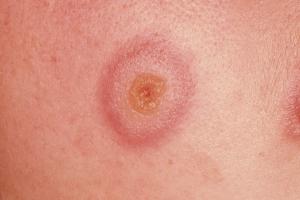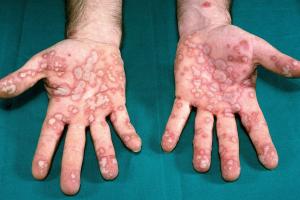Erythema multiforme
Erythema multiforme is usually a mild skin reaction triggered by an infection, or medication, ending in a few weeks. Erythema multiforme major, a severe form, can be life-threatening. Erythema multiforme mainly affects adults under 40 years old. See your GP as soon if you think you have erythema multiforme.
Symptoms of erythema multiforme
Most people with erythema multiforme will just have a rash, but other symptoms can also sometimes occur.
Rash
The rash comes on suddenly and develops over a few days. It tends to start on the hands or feet, before spreading to the limbs, upper body and face.
The rash:
- starts as small red spots, which may become raised patches a few centimetres in size
- often has patches that look like a target or "bulls-eye", with a dark red centre that may have a blister or crust, surrounded by a pale pink ring and a darker outermost ring
- may be slightly itchy or uncomfortable
- usually fades over two to four weeks

In more severe cases, the patches may join together to form large, red areas that may be raw and painful.

Other symptoms
Additional symptoms of erythema multiforme can include:
- a high temperature (fever) of 38°C (100.4°F) or more
- a headache
- feeling generally unwell
- raw sores inside your mouth, making it hard to eat and drink
- swollen lips covered in crusts
- sores on the genitals, making it painful to pee
- sore, red eyes
- sensitivity to light and blurred vision
- aching joints
These symptoms are more common in erythema multiforme major or a similar condition called Stevens-Johnson syndrome.
When to get medical advice
See your GP as soon as possible if you think you or your child may have erythema multiforme.
Your GP may be able to diagnose it just by looking at the rash, but they can refer you to a skin specialist (dermatologist) if they're not sure.
If erythema multiforme major or Stevens-Johnson syndrome is suspected, you'll be referred to hospital immediately because these conditions can be serious.
If you're unable to see a GP, contact your local out of hours service for advice.
Causes of erythema multiforme
The cause of erythema multiforme is often unclear, but some cases are the result of a reaction to an infection or medication.
The condition can't be passed from person to person.
Infections
Most cases are caused by a viral infection – often the herpes simplex (cold sore) virus. This virus usually lies inactive in the body, but it can become reactivated from time to time.
Some people will get a cold sore a few days before the rash starts.
Erythema multiforme can also be triggered by mycoplasma bacteria, a type of bacteria that sometimes cause chest infections.
Medication
Medication can occasionally cause the more severe form of erythema multiforme. Possible medication triggers include:
- certain types of antibiotics
- non-steroidal anti-inflammatory drugs (NSAIDs), such as ibuprofen
- anticonvulsants (used to treat epilepsy)
Treatments for erythema multiforme
Treatment aims to tackle the underlying cause of the condition, relieve your symptoms and stop your skin becoming infected.
Your doctor may recommend:
- stopping any medication that may be triggering your symptoms – do not try this without speaking to your doctor first
- antihistamines and moisturising cream to reduce itching
- steroid cream to reduce redness and swelling (inflammation)
- painkillers for any pain
- antiviral tablets, if the cause is a viral infection
- anaesthetic mouthwash to ease the discomfort of any mouth sores
More severe cases may be treated in hospital. The doctor treating you will recommend the best course of action for you based on your symptoms.
Complications of erythema multiforme
Most people with erythema multiforme make a full recovery within a few weeks. There aren't usually any further problems and the skin normally heals without scarring.
But there is a risk the condition could come back at some point, especially if it was caused by the herpes simplex virus.
You may be given antiviral medication to prevent attacks if you experience them often.
In severe cases, possible complications can include:
- blood poisoning (septicaemia)
- septic shock (where blood pressure drops to a dangerously low level)
- a skin infection (cellulitis)
- permanent skin damage and scarring
- permanent eye damage
- inflammation of internal organs, such as the lungs or liver
More useful links
The information on this page has been adapted from original content from the NHS website.
For further information see terms and conditions.